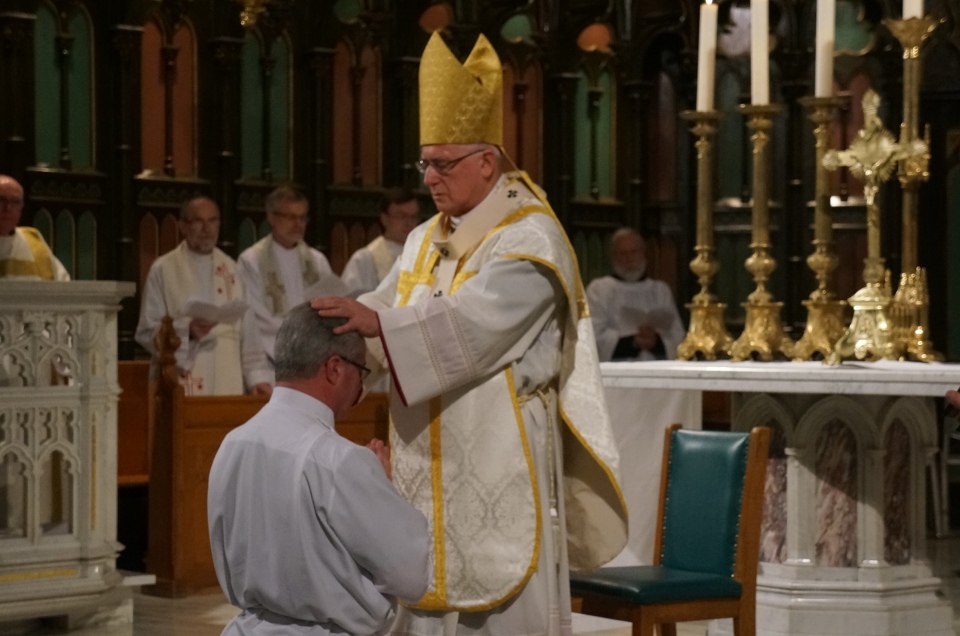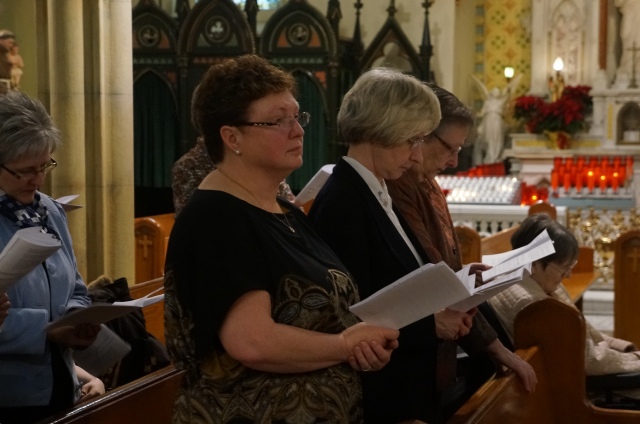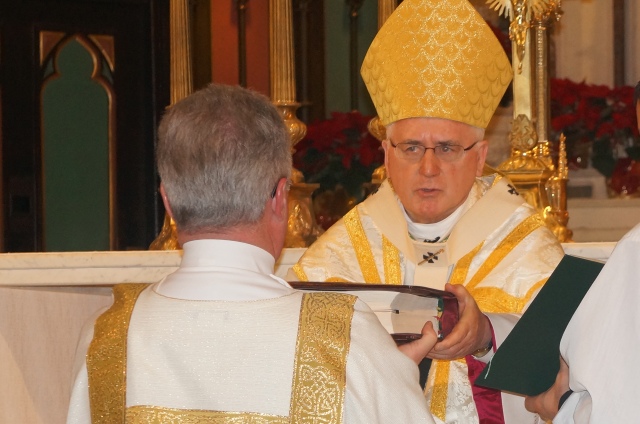St. Patrick Basilica, Ottawa, ON—January 12, 2013
THE DIACONAL ORDINATION OF CARL LEONARD REID
[Texts: Numbers 3.5–9; Psalm 89; 1 Timothy 3.8–10, 12–13; Luke 12.35–44]
My dear Brothers and Sisters in Christ,
During a formal ad limina visitation I made to Rome with other Canadian bishops, Pope Benedict XVI presented each of us with a beautiful pectoral cross. It features a replica of a twelfth century processional cross found in the museum of the Lateran cathedral basilica that is striking for the many biblical images found on it.
The scenes represent family life and dreams, vocations and sacrifice, separations and the joy of reunion. We can indentify with many of these consoling sentiments on this important day.
At the centre of both the vertical and horizontal bars of the cross is a depiction of the crucifixion of Jesus, with his Mother and the Beloved Disciple being bound into the new family of the Church. The Risen Christ constantly says to the Church, “behold, I make all things new.” Among these things is today’s gesture of reconciliation that recognizes the spiritual leadership of Carl Leonard Reid. It also calls him to develop his gifts along a new dimension.
On this day, the liturgy commemorates our first Canadian woman saint, Marguerite Bourgeoys. We rejoice that family faith, vocational discernment, self-offering, and openness to the Holy Spirit have brought us together in celebration of the Eucharist.
The experience of family is at the core of each person’s life journey. I extend a most cordial welcome to the wife and siblings, friends and associates of our brother in Christ, Carl Leonard Reid. We give thanks to God for the way in which his family and friends nurtured faith in him, primarily but not solely in the Anglican tradition.
Carl, my son, your life up to now has been one of profound commitment and witness. Your formation and ministry within the Anglican tradition have provided you solid spiritual bedrock. You have been a bold witness to Christ and to the truths of Catholic Christianity–often at great cost to yourself.
Coming into communion with the Catholic Church through the Ordinariate, you bring with you the rich spiritual patrimony of the Anglican Church. Now, your ministry of bridge-building extends to creating bonds of friendship and communion between the Catholic Church and ecclesial communities of the Anglican and other Christian traditions.
In the Book of Numbers that we heard at the beginning of the Liturgy of the Word, Moses appoints Levites to assist in the devotional life of God’s holy people. The role of Levites, as is the case with deacons, was to assist the priests and to perform duties for Aaron the high priest and for the whole assembly. They were, in effect, to help the people have access to God’s sanctuary. But they were also to set boundaries between the sanctuary and the camp, and to teach distinctions between virtue and sin to keep God’s people out of harm’s way. There is an order and harmony in the design of God’s creation. If proper teaching and practice are not instilled, then life and goodness suffer. Chaos and death ensue.
Beloved brothers and sisters: this, our son who is your relative and friend, is now to be advanced to the Order of Deacons, that is anticipated in the role of Levites.
Strengthened by the gift of the Holy Spirit, he will help the Bishop and his priests in the ministry of the word, of the altar, and of charity. He will be a servant to all. As a minister of the altar, he will proclaim the Gospel, prepare the sacrifice, and distribute the Lord’s Body and Blood to the faithful.
In addition, it will be his duty, at the Bishop’s direction, to exhort believers and unbelievers alike. He will instruct them in holy doctrine. He will preside over public prayer, administer Baptism, assist at and bless Marriages, bring Viaticum to the dying, and conduct funeral rites.
Consecrated by the laying on of hands that comes down to us from the Apostles, he will perform works of charity in the name of the Bishop or the pastor. With the help of God, his labour will be a public testimony of a disciple of the Lord who, as we heard him describe humble service in the gospel lection, came not to be served, but to serve.
As a Deacon, do the will of God from your heart. Serve the people in love and joy as you would the Lord. Because no one can serve two masters, in the spirit of the warnings Paul gave Timothy in the second lesson, look upon all defilement and avarice as serving false gods.
Like those chosen by the Apostles for the ministry of charity, you should be a man of good reputation, filled with wisdom and the Holy Spirit. See your ministry of caring for the poor and needy as an extension of God’s compassionate mercy.
As Pope St. Leo the Great said so marvellously, “there is nothing more worthy of man than that he become an imitator of his Creator and ... the executor of the divine plan. For when the hungry are fed, the naked are clothed and the sick are strengthened–is this not the divine assistance that the hand of the minister accomplishes, and is not the goodness of the servant the hand of the Lord at work? For when God finds a helper to realize his merciful touch, he so limits his omnipotence, that he alleviates the sufferings of man through the actions of men.” In your ministry, invite other disciples to enter into this outreach to the poor with you.
Firmly rooted and grounded in faith, you are to show yourself chaste and beyond reproach before God and man, as is proper for a steward of God’s mysteries.
Never allow opposition to turn you away from the hope offered by the Gospel. Now you are not only a hearer of this Gospel but also its minister. Express by your actions the word of God that your lips proclaim, so that the Christian people, brought to life by the Spirit, may be a pure offering accepted by God.
Then on the last day, when you meet the Lord face to face, he will say, “Well done, good and faithful servant, enter into the joy of your Lord.”
Photos: courtesy of Deborah Gyapong




Great photos. I think it is a beautiful rite to be ordained.
ReplyDeleteWedding Officiant Services NJ
ReplyDelete